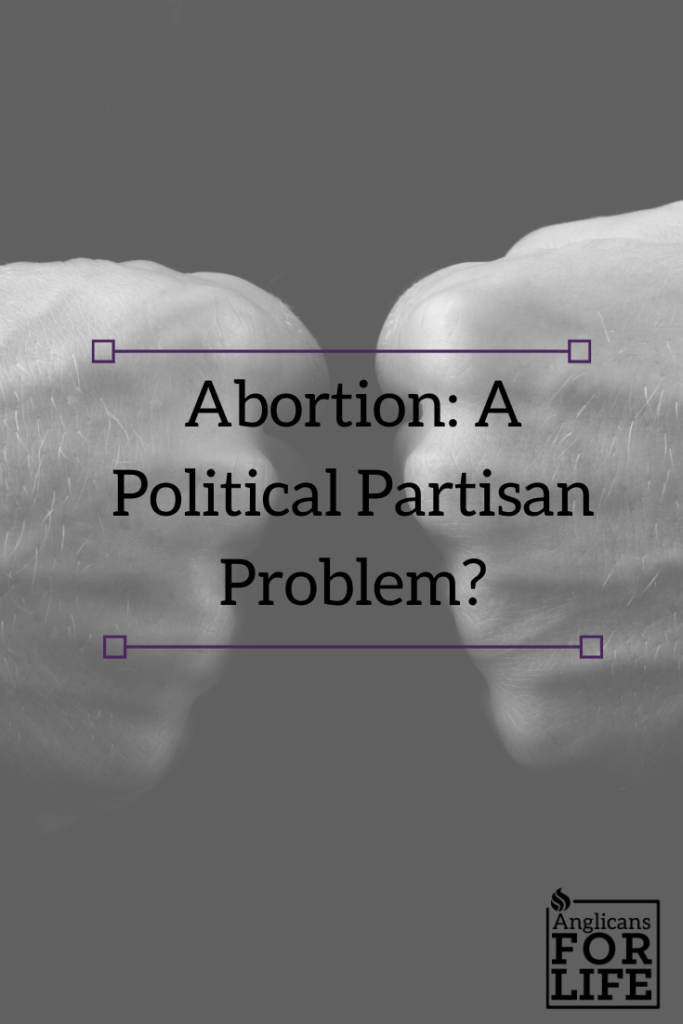
We live in a time of intense partisan divisions coupled with a penchant for virtue-signaling. Every decision has become a statement of loyalty to one party or idea. Unfortunately, this reality has affected life issues as well. Some well-meaning clergy avoid taking a firm stand on abortion lest they be associated with one political party. By refusing to take a stand, these shepherds muddy the waters for their sheep. Despite appearances, abortion is not a partisan issue. Therefore, Christians have a duty to speak out about issues of life. It will be helpful to explain why abortion appears to be a partisan issue. Then we can begin to chart a path forward.
Abortion can be seen as a partisan issue, as casual observers note that orthodox Christians tend to vote with one political party because of its stand on abortion. But in order to understand why orthodox Christians tend to vote for members of one political party over another, let’s reframe the real loyalties seen in voting choices.
The American political system lends itself to polarization. We only have two viable political parties. We do not have a parliamentary system with a multitude of smaller parties that have to cooperate. Each party has taken an official stand on the issue of abortion: one for protecting the unborn and the other for abortion on demand. However, neither party adheres to an entirely orthodox Christian platform, but Christians find themselves with only two viable choices and one vote. Voting therefore becomes a blunt tool for public policy problems which really require a surgical instrument.
Many Christians have chosen to focus on the life issue, because they realize its importance to God from the beginning (Genesis 4). God judges nations, whether those nations recognize Him or not (Amos 1—2). Christians recognize that abortion is murder and do not wish to invite divine judgment on their nation. Therefore, they choose to vote for the party or politicians that has officially adopted a pro-life stance. Their vote does not necessarily affirm all of this party’s or politician’s policies, but it does affirm that Christians want to end the scourge of abortion.
I may hasten to add, though briefly, that Christians should rejoice that not all members of a party hold to a pro-choice stance. A pro-life candidate, regardless of party, is worthy of the Christian vote. And it would be hoped that, if pro-life candidates across party lines gained votes, the politicians would reconsider their stances.
Based on this, we must recognize that abortion has the appearance of a partisan issue in the United States. But appearances, as it is said, can be deceiving. Abortion only appears to be a partisan issue because one party has co-opted the pro-life platform. If both parties agreed on the abortion issue, one way or another, I doubt Christians would remain a solid voting bloc. But Christians will vote for life. It is in our blood. Christians have opposed abortion as long as there have been Christians.
How then should Christians chart a path forward? First, we must insist, boldly and publicly, that abortion must go. We cannot let fear of being labeled as a partisan or as “political” stop this. In short, we must fear God more than we fear man and take our stand against abortion. This starts with our clergy. Second, we must not expect politicians to do anything substantial about abortion. I may be cynical, but if politicians worked in earnest to overturn Roe v. Wade, they would risk some of their constituencies. If we want to see the end of abortion, the political solution will come after the work is already done. This job falls to the Church. We must seek to inform the public conscience about the horrors of abortion. We must also call sinners to repentance: those who procure an abortion, those who perform abortions, and those who are complacent about abortion. Further, we can promise what even the best politicians cannot: forgiveness for all who turn from their sins to our Lord Jesus Christ.
Most importantly, our clergy cannot remain neutral. We will be held to account for our faithfulness in this matter. This is not an American political issue. The Church has opposed abortion throughout her existence. We need not love our political system to remain faithful within it. Regardless of the politics involved, abortion requires a pastoral response.
As a final word, I want to address one particular group: those who have come into the Anglican Church from a more fundamentalist background. These people grew up in churches that confused Christian piety with political activism. More to the point, they grew up in churches strong on condemnation and weak on absolution. A pro-life stand may strike them as the kind of partisan political condemnation and compromise they lived through, and so they want no part of it. To these folks especially I want to say: ignore the partisan aspects for a moment. Abortion is an issue of righteousness, regardless who upholds the pro-life position politically.
Abortion requires pastoral care: we want to provide a prophetic voice to prevent abortion while providing absolution for the penitent. Abuse of something does not take away its legitimate use. Do not let your past experience stop you from doing what is right now.
Written by The Rev’d Deacon Matthew R. Miller, PhD. Matthew lives in Wichita, KS, with his wife and three young daughters. He holds a PhD from the Southern Baptist Theological Seminary and is a Transitional Deacon in the Jurisdiction of the Armed Forces and Chaplaincy.
